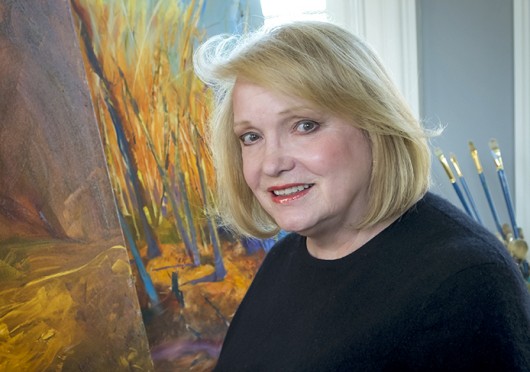
Jan Dilenschneider is a 1965 OSU graduate with a bachelor’s degree in fine arts education.
Credit: Courtesy of Patrick Malone
A passion for the arts, combined with a desire to give back, led Ohio State alumna Jan Dilenschneider to choose to help oppressed scholars in art from around the world.
Dilenschneider, who graduated from Ohio State in 1965 with a bachelor’s degree in fine arts education, said her husband, Robert Dilenschneider, surprised her by giving a gift of $250,000 to the Institute of International Education. This gift established the Janet Hennessey Dilenschneider Scholar Rescue Award in the Arts.
Mark Angelson, chairman of the IIE’s Scholar Rescue Fund, said the institute began its tradition of rescuing scholars from troubled areas around the world in 1921 with the rescues of Russian scholars from the Bolshevik Revolution and Stalinism.
In 2002, the IIE formalized the program into the Scholar Rescue Fund, which is the largest fund in the world specifically dedicated to rescuing scholars, Angelson said.
Scholars in area of contention around the world have long been persecuted for their work, and the IIE aims to help these scholars by providing them with fellowships. The fellowships allow these scholars a safe place to finish their work and eventually to return to their home countries, according to the IIE website.
“I’ve always been very impressed with the Scholar Rescue Program,” Jan Dilenschneider said. “Just in the last 11 years, they have brought over 525 endangered scholars in many different areas (of study), mostly science, engineering and things of that sort.”
Jan Dilenschneider said her husband, Robert Dilenschneider, and Angelson came up with the concept behind the Janet Hennessey Dilenschneider Scholar Rescue Award in the Arts. The award is the first of its kind for the IIE because it is dedicated to specifically helping arts scholars involved in music, architecture, poetry, painting or the performing arts.
The Janet Hennessey Dilenschneider Scholar Rescue Award in the Arts is set to provide 10 scholars with fellowships of up to $25,000 so they can be placed at host universities outside of their home countries and continue working freely, according to a February IIE press release.
Robert Dilenschneider, who earned a master’s degree in journalism from OSU in 1967, said he has been involved with the IIE since the 1980s.
“The reason this is important is that young people — students, in particular, but also teachers — need to experience other cultures in a positive and constructive way,” Robert Dilenschneider said. “With understanding, you get a better appreciation of what’s going on, you make friends and we have less strife in the world.”
Robert Dilenschneider said his wife’s background as a painter played a major role in his decision to contribute to the IIE’s Scholar Rescue Fund.
“It was obvious to me that if we were going to do something to support the IIE, we should do it through the arts. That’s the reason we reached out,” Robert Dilenschneider said. “Jan will be the bridge between the IIE and the art community in oppressed countries.”
Jan Dilenschneider said her experiences as a student at OSU had a major impact on her life. When a professor encouraged her to pursue a major in fine arts, Jan Dilenschneider said she had a “revelation.”
“I chose fine arts education because Ohio State is quite renowned in that area,” she said.
For the last 20 years, Jan Dilenschneider said she has concentrated on painting extensively, while also standing up for the importance of inductive reasoning and creativity.
“I’m afraid with all of the computers and all of the handheld devices our kids are using today that they’re going to lose out on that creative thinking,” Jan Dilenschneider said.
After 10 scholars are helped by the Janet Hennessey Dilenschneider Scholar Rescue Award in the Arts, Jan Dilenschneider said she is hoping to write a book titled “From Oppression to Expression,” which would reflect on the experiences of each scholar.
When it comes to selecting scholars that need help, Angelson said the IIE has a full-time staff dedicated to finding endangered scholars and a global selection committee that meets periodically.
“IIE has 19 offices around the world. We’ve got a staff of nearly 700 working on 250 different programs so our ability to place (scholars) in safe places the world over is a very good thing for us,” Angelson said.
The IIE’s Scholar Rescue Program was able to help 275 scholars from Iraq, the majority of whom were placed in the Middle East and North Africa in order to “curtail the brain drain from the region and also to facilitate easy repatriation,” Angelson said.
Jan Dilenschneider said the Scholar Rescue Fund is important because oppression is happening and when scholars are taken in, the host universities are saving lives along with important pieces of culture.
“The point is that these artists will be the artists that teach the next generation what the fine arts are all about,” she said.


